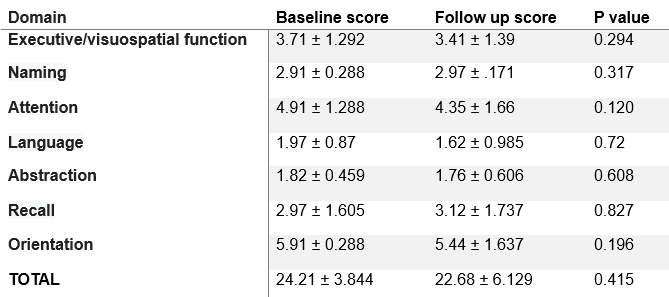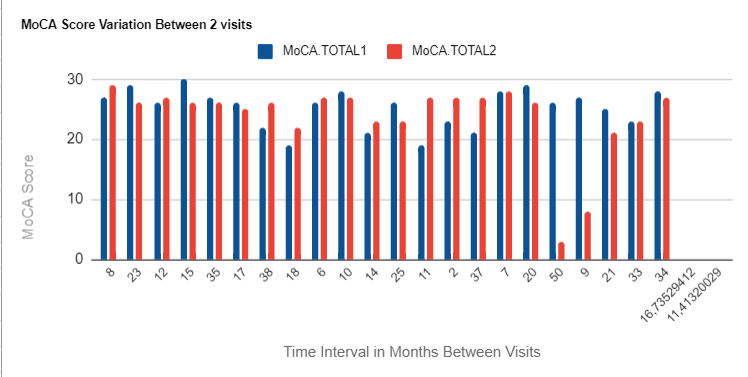Category: Parkinson's Disease: Cognitive functions
Objective: To longitudinally assess cognitive function post-DBS in Patients with Parkinson’s Disease.
Background: Parkinson’s disease (PD) is a chronic neurodegenerative condition that primarily affects the motor system but can also present a wide range of cognitive impairment that significantly impacts patients’ quality of life. Deep brain stimulation (DBS) has become an important therapeutic option for PD patients experiencing motor symptoms refractory to medication. Among the nonmotor symptoms, mild cognitive impairment (MCI) is present even in the early stages of the disease [1]. However, its DBS effect on PD’s cognitive impact has been less clear, and the possible long-term effects of the procedure on cognition are limited and require a systematic review [2]. The effects of DBS on cognition are still uncertain due to some limitations [3].
Method: In this retrospective, observational, longitudinal study, the evolution of cognitive impairment in 34 patients with PD treated with DBS was investigated using the Montreal Cognitive Assessment (MoCA) test. Study criteria included adults, Mexican, involving all age groups. Patients were evaluated during two separate medical visits at least 12 months apart. The study was conducted at the National Institute of Neurology and Neurosurgery between 2017 and 2023.
Results: Among the 34 patients evaluated using the MoCA test (38.23% female, mean age 52.7 ± 9.3 years, with an interval between evaluations of 16.7 ± 4.3 months), the mean MOCA score at the first evaluation was 24.1, which worsened to 22.68 at the second evaluation (p=0.415). This suggests that the null hypothesis is retained, indicating no significant change. Improvement was noted in language, attention, and orientation, while a decline was observed in other items, as illustrated in Table 1. The results also suggest that longer intervals between visits may be associated with a pronounced cognitive deficit (Figure 1).
Conclusion: This analysis suggests that DBS therapy in people with Parkinson’s disease does not show a significant effect on cognitive function. Additionally, it is important to consider that the MoCA test is a screening tool and a complete neuropsychological exam might be needed to corroborate our findings.
Table 1. MOCA TEST Scores Across Two Visits
Fig. 1. MoCA Scores vs. Visit Interval (Months)
References: 1. Philipson, J., Blomstedt, P., Fredricks, A., Hariz, M., Stenmark Persson, R., & Jahanshahi, M. (2021). “Short- and long-term cognitive effects of deep brain stimulation in the caudal zona incerta versus best medical treatment in patients with Parkinson’s disease.” Journal of Neurosurgery JNS, 134(2), 357-365. https://doi.org/10.3171/2019.12.JNS192654
2. Pal, G.D., Corcos, D.M., Metman, L.V., Israel, Z., Bergman, H., & Arkadir, D. (2023). Cognitive Effects of Subthalamic Nucleus Deep Brain Stimulation in Parkinson’s Disease with GBA1 Pathogenic Variants. Mov Disord, 38, 2155-2162. https://doi.org/10.1002/mds.29647
3. Racki V, Hero M, Rožmarić G, Papić E, Raguž M, Chudy D, & Vuletić V. (2022). Cognitive Impact of Deep Brain Stimulation in Parkinson’s Disease Patients: A Systematic Review. Frontiers in Human Neuroscience, 16, 867055. doi: 10.3389/fnhum.2022.86705
To cite this abstract in AMA style:
K. Velázquez-Román, G. Rivera-Monroy, R. Baños-Betancourt, W. Moguel-Cardín, A. Guerra-Anzaldo, C. álvarez-Hernández, A. Domínguez-García, A. Hernández-Medrano, A. Cervantes-Arriaga, M. Rodríguez-Violante. Assessing the Impact of Deep Brain Stimulation on Cognitive Impairment in Parkinson’s Disease: a longitudinal study. [abstract]. Mov Disord. 2024; 39 (suppl 1). https://www.mdsabstracts.org/abstract/assessing-the-impact-of-deep-brain-stimulation-on-cognitive-impairment-in-parkinsons-disease-a-longitudinal-study/. Accessed July 8, 2025.« Back to 2024 International Congress
MDS Abstracts - https://www.mdsabstracts.org/abstract/assessing-the-impact-of-deep-brain-stimulation-on-cognitive-impairment-in-parkinsons-disease-a-longitudinal-study/


